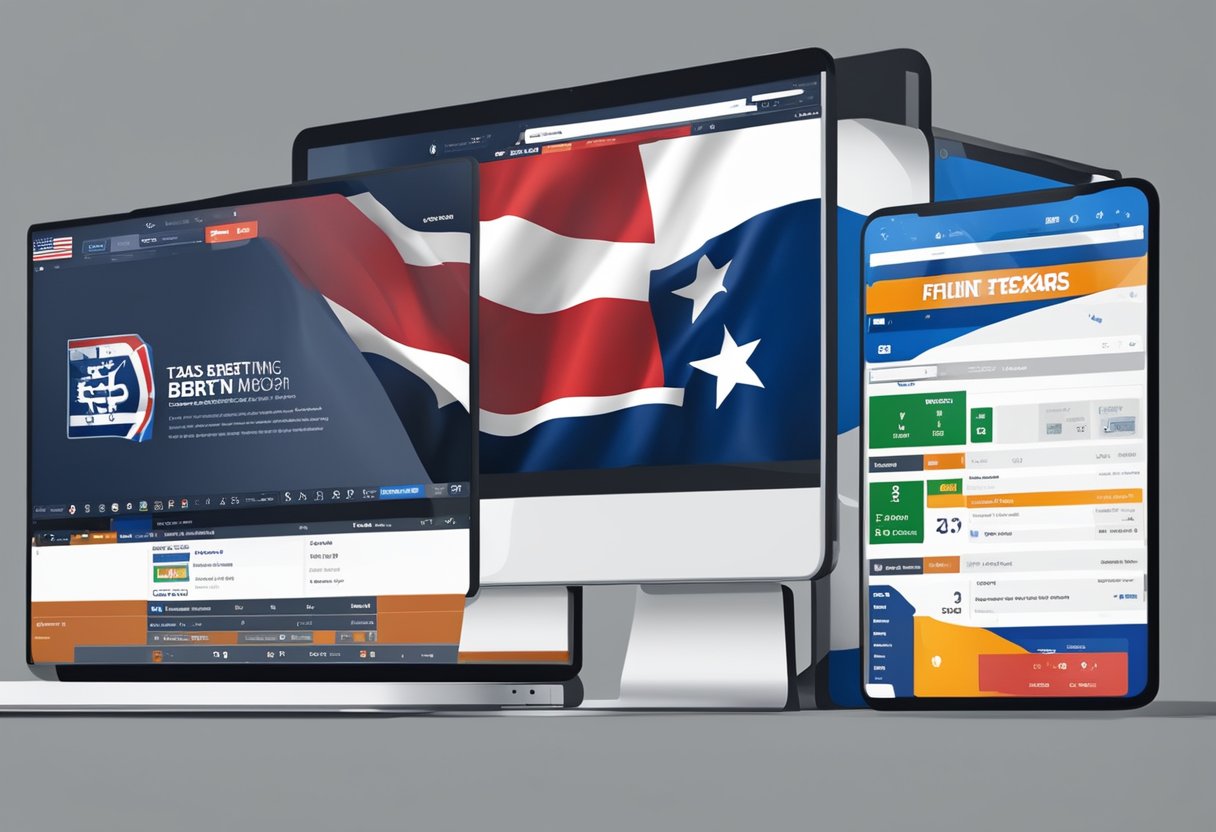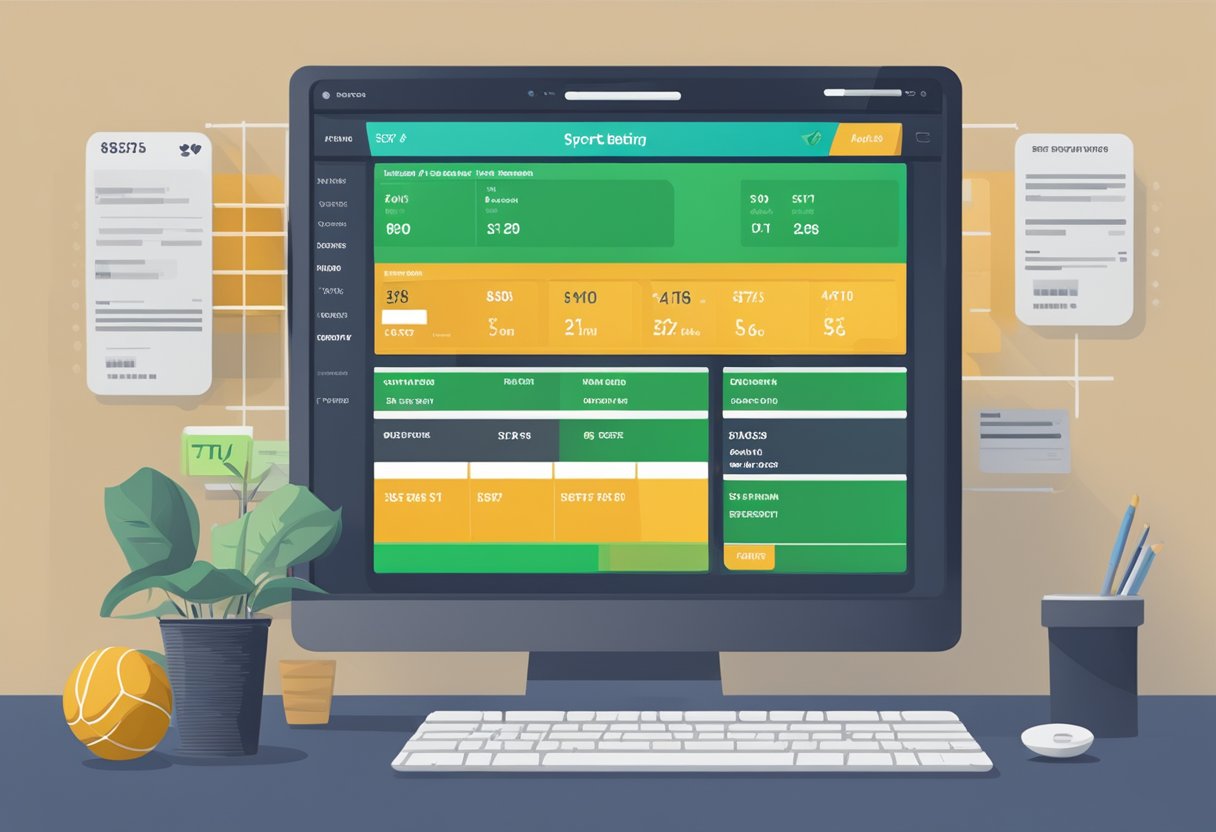Many Texans are curious about online sports betting options in the Lone Star State. Currently, traditional online sports betting remains illegal in Texas despite recent legislative efforts to change this status. While online gambling in Texas is illegal, residents can legally participate in daily fantasy sports (DFS) through platforms like DraftKings Pick6 and Underdog Fantasy.

For those interested in sports wagering, Texas does permit some limited forms of gambling including the state lottery, horse racing, and dog racing. The legal landscape continues to evolve as lawmakers consider potential changes to Texas gambling laws.
Legal Landscape of Online Sports Betting in Texas

Texas maintains strict anti-gambling laws that currently prohibit online sports betting, despite growing public support and pressure from various stakeholders including professional sports teams and gambling industry advocates.
Current Legislation and Bills
Online sports betting remains illegal in Texas as of March 2025. Recent legislative attempts to change this include HB 1942 and SB 715, which proposed frameworks for regulated sports betting. The most significant proposals were paired with constitutional amendments (HJR 102 and SJR 39) since gambling expansion requires voter approval in Texas.
These bills aimed to create licensed operators, implement consumer protections, and generate tax revenue. The Texas Sports Betting Alliance, backed by professional teams like the Dallas Cowboys and their owner Jerry Jones, has been a major advocate for these measures.
Senator Carol Alvarado has been a consistent champion for gambling legislation, arguing that Texans already bet illegally through offshore sites, sending millions in potential tax dollars out of state.
Historical Context
Texas has historically maintained restrictive gambling laws, with only limited exceptions for the state lottery, horse racing, and tribal gaming operations. The state’s conservative approach to gambling dates back decades and is deeply embedded in its legal framework.
In 2018, the U.S. Supreme Court struck down the Professional and Amateur Sports Protection Act (PASPA), which had prohibited sports betting nationwide. This ruling opened the door for states to legalize sports wagering.
While many states quickly moved to legalize sports betting following this decision, Texas has remained resistant. The state’s political culture, dominated by conservative values, has traditionally opposed gambling expansion as a revenue source.
Prospects for Legalization
The outlook for legalized sports betting in Texas appears focused on 2025 at the earliest. Governor Greg Abbott has recently shown increased receptiveness to the idea, signaling a potential shift in the political landscape.
The Texas Legislature meets biennially, with the next regular session occurring in 2025. This timing means any meaningful progress must wait until then, barring a special session.
Lieutenant Governor Dan Patrick, who presides over the Senate, has historically opposed gambling expansion and remains a significant obstacle. However, public opinion is shifting, with recent polls showing approximately 60% of Texans support legalizing online sports betting.
The Texas House has generally been more receptive to gambling legislation than the Senate. If passed by the legislature, any proposal would require voter approval through a referendum due to constitutional restrictions.
Exploring Online Sports Betting Options in Texas

Texans have several offshore sportsbook options despite the current legal status of sports betting in the state. These platforms offer various features, betting types, and cover a wide range of sports that appeal to Texas bettors.
Sportsbook Features
Most online sportsbooks serving Texas bettors provide user-friendly mobile apps that allow wagering from anywhere within state borders. These platforms typically offer secure payment methods including credit cards, cryptocurrencies, and e-wallets for deposits and withdrawals.
Customer support is available through multiple channels like live chat, email, and phone. Response times vary by platform, with some offering 24/7 assistance.
The best online sportsbooks for Texans feature competitive odds, early lines, and odds boosts on popular events. Many platforms provide live betting options where users can place wagers during games as odds update in real-time.
Sign-up bonuses and promotions are common, with many sites offering matched deposits or risk-free bets to new users.
Types of Bets Available
Texas bettors can access a variety of betting markets through offshore sportsbooks. Moneyline bets are straightforward wagers on which team will win a game.
Point spreads involve betting on whether a team will win by more than a specified margin or lose by less than that margin. Totals (over/under) focus on the combined score of both teams.
Prop bets allow wagering on specific events within games, like which player will score first or how many yards a quarterback will throw.
Parlays combine multiple bets into one high-risk, high-reward wager. All selections must win for the parlay to pay out, but the potential returns are significantly higher than single bets.
Futures bets involve predicting outcomes that will be determined later, such as championship winners.
Popular Sports and Events
NFL football dominates betting activity in Texas, with the Dallas Cowboys and Houston Texans drawing significant action. College football, especially games involving Texas, Texas A&M, and Baylor, also attracts heavy betting interest.
NBA basketball is popular with the Dallas Mavericks, Houston Rockets, and San Antonio Spurs representing the state. MLB baseball betting peaks during Texas Rangers and Houston Astros seasons.
College basketball, particularly during March Madness, sees increased betting activity. Horse racing fans can wager on events at Texas tracks like Lone Star Park and Sam Houston Race Park.
Soccer betting options include international competitions, MLS matches, and European leagues. Golf tournaments, especially major championships and events held in Texas, draw consistent betting interest.
Bonuses, Promotions, and Responsible Gambling

While sports betting isn’t currently legal in Texas, understanding how bonuses work and practicing responsible gambling are important for Texans who may use legal alternatives or anticipate future legalization. These aspects help bettors maximize value while maintaining healthy gambling habits.
Understanding Bonuses and Promotions
Texas residents currently can’t access traditional sportsbook bonuses since sports betting remains illegal in the state. However, some platforms like ParlayPlay offer alternatives with promotional codes such as “PLAYLSR” that provide up to $100 in bonus funds for new users.
When sports betting eventually becomes legal in Texas, bettors can expect several types of promotions:
- Deposit match bonuses: Sportsbooks match a percentage of your initial deposit
- Risk-free bets: Get your stake back as bonus funds if your first bet loses
- No-deposit bonuses: Free funds to bet without requiring a deposit
- Odds boosts: Enhanced payouts on specific bets
Most bonuses come with terms like wagering requirements, minimum odds, and time limits. Reading the fine print is crucial before claiming any promotion.
Responsible Gambling Practices
Responsible gambling should be a priority regardless of where you place bets. Setting a budget before betting is essential – only wager money you can afford to lose.
Key responsible gambling practices:
- Set time and money limits for betting activities
- Never chase losses by betting more than planned
- Use responsible gambling tools provided by betting platforms
- Take regular breaks from gambling activities
- Know the warning signs of problem gambling
Many legitimate betting platforms offer self-exclusion options and cooling-off periods. They also provide resources to help those who develop gambling problems.
Educational resources about odds and probability help bettors make informed decisions. Understanding that gambling should be entertainment, not an income source, is fundamental to responsible betting.
Deposits and Withdrawals

Managing your money effectively is crucial when betting online in Texas. Online sportsbooks offer various payment options for both adding funds and collecting winnings.
Secure Payment Methods
Most Texas-friendly betting sites accept major credit cards like Visa and Mastercard for deposits. These transactions typically process instantly, allowing you to bet right away.
BetOnline stands out by accepting a wide variety of payment methods, including credit cards for quick deposits. Many sites also offer e-wallet options such as Play+ cards, which serve as intermediaries between your bank and the betting site.
Cryptocurrency has become increasingly popular for online betting transactions. Bitcoin, Ethereum, and other digital currencies provide enhanced privacy and often come with fewer fees than traditional banking methods.
Online banking transfers are another common deposit method. These connect directly to your checking account and provide a secure way to fund your betting activities.
Withdrawal Time Frames and Limitations
When it’s time to collect your winnings, payout speeds vary significantly between betting sites. BetRivers offers relatively fast withdrawals through methods like Play+ and online banking.
Most sites implement minimum and maximum withdrawal limits. These typically range from $10-$20 on the low end to several thousand dollars for maximum withdrawals. High-rollers should verify these limits before choosing a platform.
Processing times depend on your chosen method. E-wallets generally provide the fastest payouts, often within 24-48 hours. Bank transfers and credit card withdrawals may take 3-5 business days to complete.
Identity verification is required before processing withdrawals. This security measure protects your funds but may add a day or two to the withdrawal process, especially for first-time cashouts.
The Role and Influence of Texas Sports Teams

Texas sports teams have become significant players in the push for legalized online sports betting. Major franchises are taking public positions on the issue while considering how betting could change their relationship with fans.
Professional Teams’ Stance on Betting
The Houston Texans have publicly supported giving Texans the choice to participate in regulated sports betting. This represents a significant shift as professional teams increasingly view betting as a potential revenue stream rather than a threat to integrity.
Several other professional teams across Texas have formed coalitions to advocate for legalization. These groups include representatives from the Dallas Cowboys, Houston Astros, and Dallas Mavericks.
Teams in San Antonio and other Texas cities are carefully considering their positions as public support grows. The stance of these franchises carries weight with lawmakers and can influence legislative conversations.
Professional teams see regulated betting as preferable to the current unregulated market where Texans bet anyway but without consumer protections or tax benefits for the state.
Impact on Fan Engagement
Sports betting could transform how fans interact with Texas teams. Research suggests betting fans watch more games, for longer periods, and engage more deeply with team content.
The Dallas Cowboys and Houston Astros would likely see increased viewership and merchandise sales if betting were legalized. Teams are already preparing enhanced in-stadium experiences that could incorporate betting elements.
Fan engagement through fantasy sports has already demonstrated the appetite for deeper statistical involvement. Professional teams are developing apps and platforms to capitalize on this interest once betting becomes legal.
Teams are balancing the opportunity with responsibility, knowing they must protect younger fans while engaging adult sports bettors. This dual approach emphasizes both the entertainment value and the need for responsible gambling practices.
Alternative Betting Avenues in Texas

While traditional sports betting remains restricted in Texas, residents have several legal alternatives to explore. These options provide Texans with opportunities to place wagers and enjoy betting experiences without violating state laws.
Daily Fantasy Sports (DFS) and Esports
Daily Fantasy Sports operates in a legal gray area in Texas. Major platforms like DraftKings and FanDuel continue to serve Texas customers despite some legal questions. These sites let users create fantasy teams and compete for real money based on athlete performance.
DFS differs from traditional sports betting because it’s considered a game of skill rather than chance. Players must research statistics and make strategic decisions when building their teams.
Esports betting is gaining popularity in Texas. Fans can bet on competitive video game tournaments featuring games like League of Legends, Counter-Strike, and Dota 2. Most esports betting occurs through offshore platforms since it isn’t specifically regulated in Texas.
Many Texans enjoy participating in DFS contests during major sporting events like the NFL season and March Madness.
Horse Racing and Simulcast Betting
Horse racing represents one of the few legal forms of gambling explicitly permitted in Texas. The state has several race tracks including Lone Star Park in Grand Prairie and Sam Houston Race Park in Houston.
Texans can place pari-mutuel wagers at these tracks on both live races and simulcast events from around the country. Simulcast betting allows bettors to wager on races occurring at other tracks nationwide.
Online horse racing platforms like TVG, TwinSpires, and AmWager operate legally in Texas. These services let residents place bets from home on races across the country and internationally.
The Texas Racing Commission regulates all horse racing activities in the state. While this industry faces challenges, it remains a popular betting option for many Texans looking for legal gambling opportunities.
Poker and Casino Games
Traditional casino gambling remains largely prohibited in Texas with some exceptions. The state has no commercial casinos, but there are two tribal casinos operated by the Kickapoo Traditional Tribe and the Tigua Tribe.
These tribal casinos offer limited gaming options including electronic bingo machines. However, they cannot offer table games like blackjack or roulette due to state restrictions.
Many Texans travel to neighboring states like Louisiana and Oklahoma to visit full-service casinos. These border casinos actively market to Texas residents.
Online poker and casino games exist in another gray area. While technically not legal under Texas law, many offshore sites still accept Texas players. These platforms operate outside US jurisdiction and offer poker, slots, and table games.
Offshore Betting Platforms
Offshore sportsbooks provide the most comprehensive sports betting option for Texans. Sites like Bovada, MyBookie, BetUS, Everygame, and BetNow accept Texas customers despite operating outside US regulations.
These platforms offer betting on professional and college sports, including Texas teams. They typically provide competitive odds and various betting markets similar to regulated US sportsbooks.
Popular Offshore Options for Texans:
- Bovada: Known for quick payouts and live betting
- BetOnline: Offers extensive betting markets and promotions
- BetUS: Features exclusive bonuses and college sports betting
- BetNow: Provides various promotions for Texas bettors
Using offshore sites comes with risks. These platforms operate without US consumer protections, and users may face challenges with deposits, withdrawals, and dispute resolution.
The legal status of betting with these sites remains complicated. While Texas law prohibits gambling, enforcement typically targets operators rather than individual bettors.
Navigating the Regulatory Environment

Understanding Texas’s stance on sports betting requires knowledge of complex laws and potential legislative changes. The state currently maintains strict gambling prohibitions while facing increasing pressure to join other states that have embraced legalization.
Texas and Federal Gaming Laws
Texas maintains some of the strictest gambling laws in the United States. Section 47.02 of the Texas Penal Code explicitly prohibits most forms of gambling, including online sports betting.
This prohibition remains in effect despite the 2018 Supreme Court decision that struck down the Professional and Amateur Sports Protection Act (PASPA), which had previously limited sports betting nationwide.
For Texans, participating in online sports betting typically means using offshore platforms that operate outside U.S. jurisdiction. However, this carries legal risks as these activities remain technically illegal under state law.
Federal laws also impact the situation, with interstate gambling regulations creating additional complexity for potential operators interested in the Texas market.
The Texan Path to Sports Betting Legalization
Recent legislative efforts have attempted to change Texas’s stance on sports betting. Bills like HB 2070 and HB 1275 sought to establish frameworks for legal sports betting operations but failed to gain sufficient support.
Governor Greg Abbott has reportedly shown increased receptiveness to the concept of legalized sportsbooks and casinos in recent weeks. This represents a potential shift in the political landscape that has traditionally opposed gambling expansion.
Experts believe economic factors may eventually tip the scales toward legalization. Texas residents currently spend millions gambling in neighboring states with legal operations.
Any path to legalization would likely require:
- Constitutional amendments
- New regulatory frameworks
- Tax structure development
- Consumer protection measures
The timeline for potential legalization remains uncertain, with no clear legislative path forward for 2025.
Future of Online Sports Betting in Texas

Texas stands at a crossroads with sports betting legislation. Despite strong opposition, economic incentives and changing attitudes suggest the Lone Star State may eventually join other states in legalizing this form of gambling.
Potential Economic Impacts
Texas could see significant financial benefits from legalizing online sports betting. Recent studies indicate substantial potential tax revenue that could fund public services across the state. It is estimated that Texas will reach a sports betting handle of approximately $24 billion annually, which would render a substantial tax contribution in the state.
Experts estimate annual tax revenues in the hundreds of millions once the market matures. These funds could support education, infrastructure, or property tax relief.
Job creation represents another key benefit. Legal betting operations require staffing for customer service, tech support, marketing, and compliance roles. These positions would likely offer competitive wages in urban centers.
The illegal betting market in Texas currently sends millions of dollars out of state or to offshore operators. Legalization would keep this money in the Texas economy and under proper regulatory oversight.
Changing Cultural Attitudes
Public opinion in Texas regarding gambling has shifted noticeably in recent years. Polls show increasing support for legalized sports betting across demographic groups.
Governor Greg Abbott has recently shown more openness to discussing gambling legislation, according to recent reports. This signals a potential shift in the political landscape that has traditionally opposed expansion of gambling.
The perception of sports betting has evolved from a vice to a form of entertainment. Many Texans already bet through illegal channels or by traveling to neighboring states.
Religious and conservative groups still maintain significant influence in Texas politics. Their continued opposition remains a hurdle to legalization efforts.
Interstate Comparisons
Louisiana’s successful implementation of sports betting provides a neighboring case study for Texas. The state has generated significant tax revenue while implementing responsible gambling measures.
Texans currently cross state lines to place legal bets in Louisiana, Arkansas, and New Mexico. This represents lost revenue and economic activity that could remain in Texas.
States with legal sports betting have developed regulatory frameworks that Texas could adapt. These include age verification, addiction prevention programs, and taxation structures.
Several states have demonstrated that proper regulation can address concerns about crime and addiction while capturing economic benefits. This evidence may prove persuasive to Texas lawmakers.
Conclusion

The path toward legal online sports betting in Texas shows promising signs for 2025. Public opinion strongly favors legalization, with polls indicating approximately 60% of Texans support online sports betting.
The economic argument is compelling. Currently, Texans are already placing bets through illegal channels, sending millions of untaxed dollars outside the state. Legalization would redirect this revenue into state coffers.
Governor Abbott’s support represents a significant political shift that could help overcome past legislative resistance. The Texas Senate has traditionally opposed gambling expansion, but growing public and political momentum may change this dynamic.
Proponents emphasize that legal Texas sports betting would create a regulated environment protecting consumers while generating tax revenue for public services. Professional sports venues could also benefit from in-person sportsbooks, as 56% of Texans support this option.
The 2025 legislative session will likely be pivotal for Texas sports betting advocates. With increasing support across political lines and from influential stakeholders, Texas might finally join the numerous states that have embraced regulated sports wagering.
The economic, regulatory, and public opinion factors all point toward potential change in the Lone Star State’s gambling landscape. Texans interested in legal sports betting should monitor legislative developments closely in the coming months.
